With Palestinian music playing in the background, a few members of the Knox Students for Palestine (KS4P), such as senior Winter Goodner and fifth-year Kevin Cox, hung up a ‘Free Palestine’ banner at the doors of Old Main, facing the South Lawn, at noon on May 10.
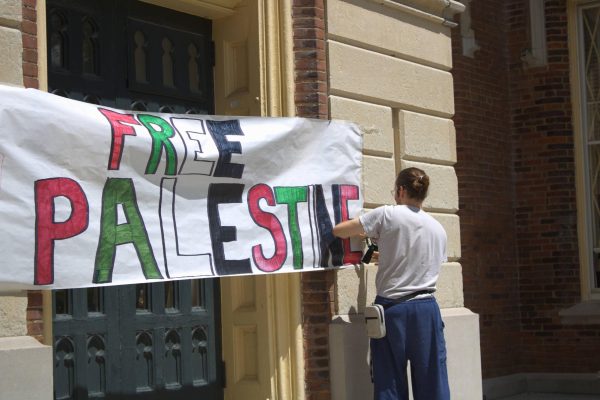
At about 12:15 p.m. at least a hundred students, including six faculty members, walked out to join the walk-out and teach-in organized by KS4P. At the steps of Old Main, the group set up water, snacks and sunscreen for the protestors.
The protest was organized to stand in solidarity with the Palestinians and demand a response from the college as no statement denouncing the violence in Palestine has been made by Knox.
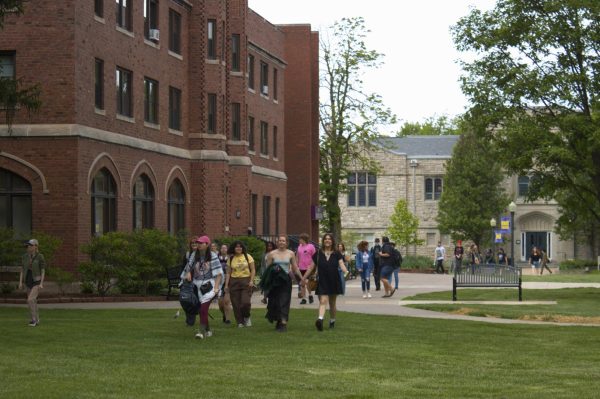
“We are not here to spread any anti semitic messages of hate or any other messages of hate. We are here to recognize the suffering of Gaza, particularly in light of the assault on Rafa,” Goodner said.
The main objective of the protest, according to senior KS4P member Marin Hart, is to demand the college regard its abolitionist history and the activism of students and faculty who led to a complete divestment from South Africa in 1996 to protest against apartheid.
Hart called for a complete boycott of Starbucks and Sabra hummus from the campus convenience store, the C-store to show support for the Palestinian cause.
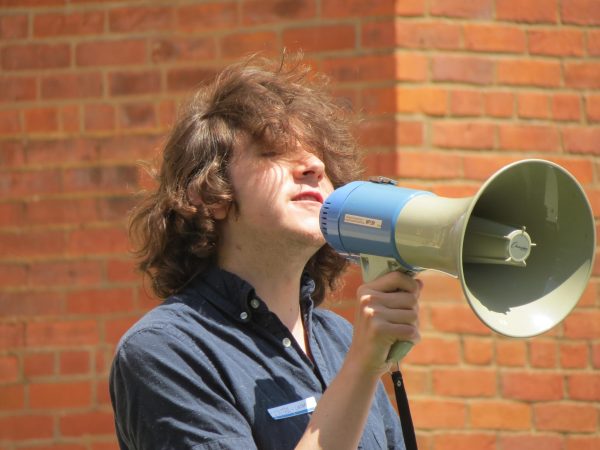
“Sabra is a venture of the Strauss group, who directly support the Israeli army,” Hart said. “That means the money that Knox spends on those products is being directly funneled into supporting Israel’s military operations, which have killed tens and thousands of people. This is not what we want our tuition money supporting.”
They also stated that the administration failed to condemn the violence in Palestine or to affirm students’ right to protest the violence in January of 2024. Then, KS4P collected 220 signatures from Knox students, calling for the removal of Starbucks and Sabra, but the administration refused on the grounds that students were still buying those products.
“I have had a couple of meetings with students before and they have asked for information about divestment and stuff like that. There is a meeting scheduled for Wednesday for students to talk about that,” Vice President for Student Development Dr. Marquita Barker said.
Barker also highlighted that while the administration was not willing to put out a direct statement addressing the situation in Palestine, her office is willing to support students in whatever way she can.
“We are always happy to talk to students but making a statement isn’t the thing that is going to solve the problem,” Barker said. “I think we have done our best to communicate to students not necessarily through a statement but through genuine support when they come to us. We are offering mental health counseling. Those things are a lot more genuine and authentic than a statement.”
Hart and Barker both looked forward to the restart of the committee for socially responsible investment, which had started in 2016, but has since been inactive.
“…we should celebrate [action to restart the committee], while also continuing to make sure the committee does what it is meant to do, which is make sure our money follows our ethics,” Hart said.
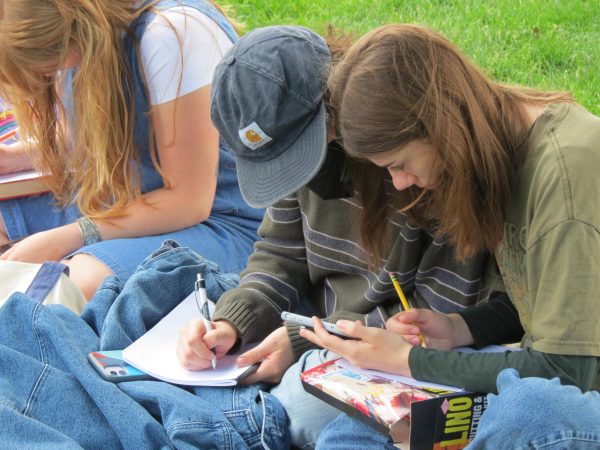
During the teach-in students at the protest implemented the jigsaw learning method, under the guidance of fifth-year Izzy Scott. Students organized into small groups to watch videos from Palestine Academy, an online information site, curated by Palestinians, offering educational videos such as ‘Palestine 101.’
“Jigsaw activity is an educational strategy that we talk about in Ed studies,” Scott said. “You have students in groups and they become experts on a topic and those groups split up and then they form merged expert groups, and you have groups with expert one, expert two etc. It gives them agency in their learning and makes them accountable for the learning of others because they have to teach their part to their classmates and their classmates have to teach them,”
Scott also emphasized that KS4P did not claim to be experts on the topic of Palestine, and acknowledged that the organization consisted of a majority of white students, who did not have all the information on the issue.
Students watched videos on a range of topics from Zionism, and the Nakba to other facets of Palestinian history. Faculty members also came to support them.
“I am here to support our students and I think every peaceful protest is valuable,” Visiting Assistant Professor of Music Maria Koutzani said.
Professor of Political Science, Karen Kampwirth, also highlighted feeling personally horrified at the violence being carried out by Hamas and the Netanyahu administration. She hoped that the recent bill passed by the Biden administration to halt the supply of bombs to Israel would minimize the violence in the region.
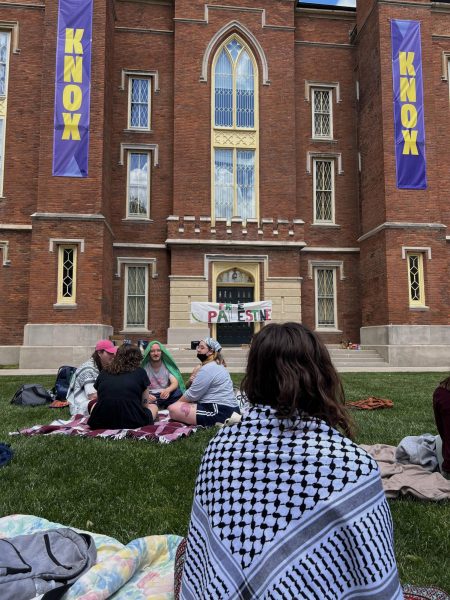
Students and faculty, such as Professor and Co-Chair of the Peace and Justice Studies Department, Leanne Trapedo Sims, dressed in red, green and black, the colors of the Palestinian flag, expressed their support for the cause through their symbolic clothing. Others wore keffiyehs which is the traditional black and white Palestinian scarf.
“My scarf is to stand with the people of Gaza, the sales go to support the people there and it represents everyone standing together with them. I am here to talk about what is happening in Palestine and in Gaza,” junior Ava Vaccarella said.
Vaccarella also shared that she learned about Zionism for the first time at the teach-in, and learning how prior to 1948, Jews and Muslims coexisted in Palestine.
Many students, such as junior Natalie Bodenhammer, said that the protest meant learning new things. During the protest, Jummah or Friday prayers were performed. They were organized by Muslim students at the teach-in, and all students were invited to participate.
“I participated in the prayer mostly out of solidarity for the Muslims on our campus and also in Palestine. It was new for me, I had never done anything like that before,” Bodenhammer said.
A large number of students, regardless of their spirituality, joined the prayer.
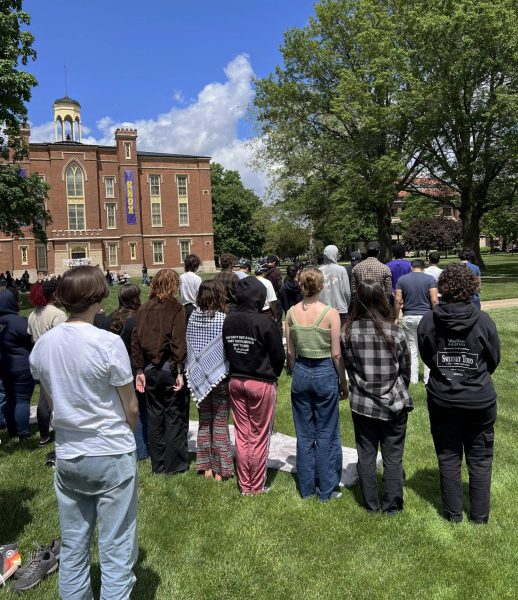
“With prayer, there is also praying for Palestine itself, the more voices we have putting it out there in the world the better,” said senior Amira Siddique.
At the end of the sit-in, students collected cardboard, markers and other craft materials to create art and signs to hang around campus, such as the watermelon sign, which has become a symbol of the Palestinian flag because of the red, green and black colors. Students also chalked messages such as ‘No one is free until we all are free’.
Messages containing the phrase ‘From the river to the sea’ were washed out by the administration to avoid interpretation of the message as anti-semitic.







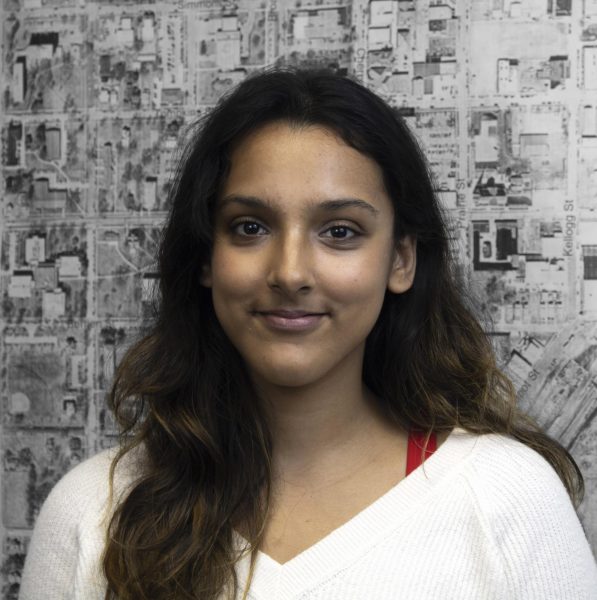
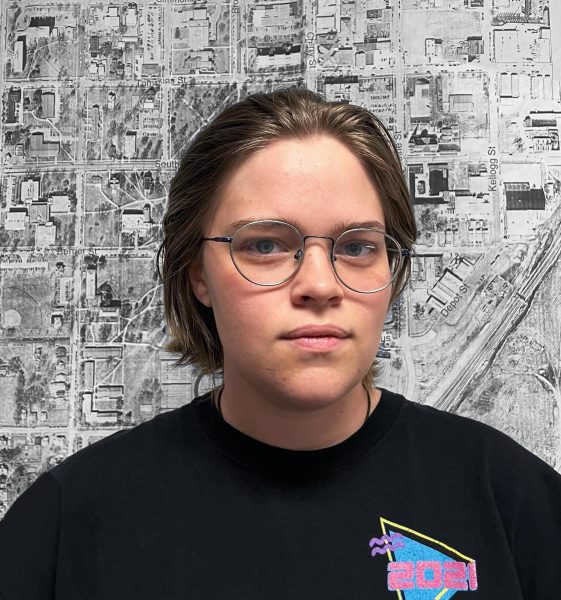
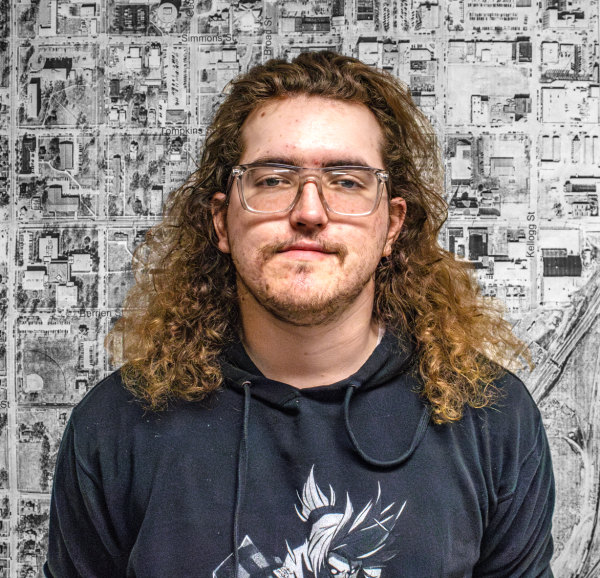
Taye Asher • May 17, 2024 at 3:25 pm
really disappointed with the admin perpetuating the idea that from the river to the sea is an antisemetic slogan. giving into obvious israeli propaganda while refusing to provide an official statement of support or any material changes isnt a good look.
Hassan Mango • May 14, 2024 at 12:16 am
Not the result we want.